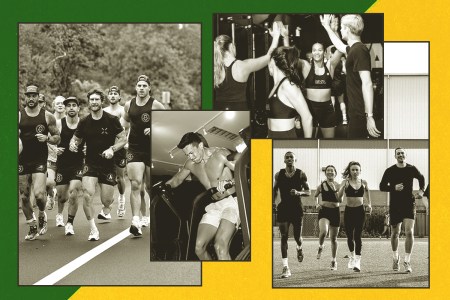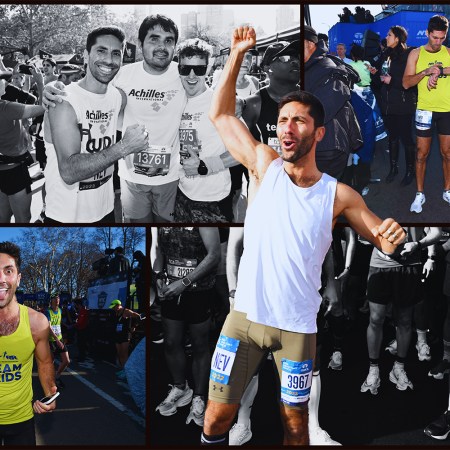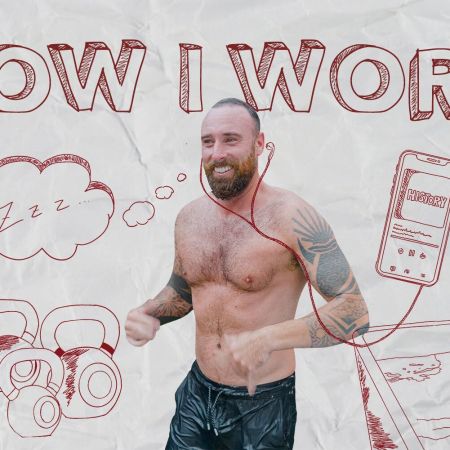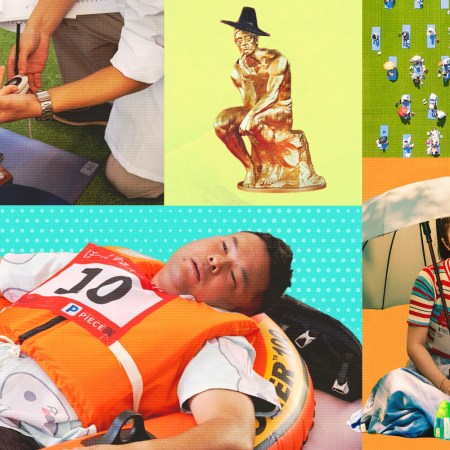On the surface, it might not seem like the best idea to write an essay about all the things I did wrong this year. Isn’t that an unhealthy enterprise in its own right?
But I’ve made my peace with it. For one, it’s my job to do things like this: I’ve been on staff at InsideHook for over seven years, and have written about wellness for most of them. I can handle the self-scrutiny! At the same time, I recently saw an Instagram post from Emily Abbate (a fellow wellness writer, who’s written for GQ for years and run a gazillion marathons) about the merits of performing a self-audit.
Basically, you sit down and chew on how things have been going. Across relationships, health and work, what’s working? What isn’t? Are you satisfied? Motivated? Exhausted? Abbate also calls the practice a “personal inventory summit,” and had this to say about it: “It’s not always easy to confront the stuff that’s gritty and raw, but the older I get — the more I realize that self-awareness is our greatest tool…. [This little audit] helps me dive head first into what’s really going on.”
So without further ado, here’s me, offering up some not-so-healthy habits of mine. This essay comes to you after I’ve already gone off in a corner (with a journal in hand) and performed my own little self-audit. I also came up with some practices I’m quite proud of — daily walks, reading before bed, meal prep — but in the interest of vulnerability and end-of-year reflection, today I’m sharing five things I need to work on.
1. Tuning Out the World
I mean this one literally. I have noise-canceling headphones, like just about everyone else, and I often deploy them to make shitty situations less shitty: music while commuting, a podcast while queuing at the grocery store, etc. I’ve noticed, though, that I have a habit of wearing them in all sorts of neutral moments, too, as a way to auto-regulate my mood and keep myself entertained.
I’m currently reading Neil Postman’s Amusing Ourselves to Death. The book will be familiar to anyone with an elementary grasp of media ecology, but it’s an oddly prescient one, published in 1985, which feared that we were headed for a future of constant pleasure and distraction. When I reach for my AirPods, I’m struck that Postman — and his inspirational text, Aldous Huxley’s Brave New World — were unfortunately on the mark.
The same could be said for how we reach for our phones, but anti-phone rhetoric is obvious at this point, and I think it’s important to think about the act of literally shutting our ears to the world, all the time. To say nothing of tinnitus, noise-cancellation robs you of so many of life’s little joys. In 2025, I want to spend more time eavesdropping, hearing birds, absorbing the buzz of the city. Some days, I know I won’t be in the mood to hear any of it. But for the majority of my days ahead, I want to start giving myself a chance.
How Aussie “Squad Training” Became the Hottest Thing in Fitness
The Athletic Clubs trades in affability, accountability and overly-active WhatsApp groups2. Overtraining
Shifting to the fitness side of things here: If you follow my wellness writing at all, you probably know I’m a runner by trade, a lifter second, and otherwise a dabbler in whatever classes, sports and lifestyle activities I want to play or are currently having a “moment.” This sort of active life is a fun one, but I do have a habit of overdoing it.
I dealt with a couple injuries this year — a rotator cuff issue and a strained muscle in my low back — and both were directly related to overtraining. It’s kind of rich, considering I routinely instruct others to stop overtraining. Even if you avoid injury, the practice has diminishing returns. But like many other wellness fanatics, I find it hard to stop sometimes. I often invent little quests in my head (e.g., over the last month, I dragged my legs to 1,000 miles of running for the year…because it felt like something I should do) and ignore the pains I accrue along the way.
This seems to be a common issue. I’d love to meet someone with a perfectly balanced workout regimen; most adults I know either can’t seem to stick to a workout routine or work out too much. My white whale next year, and in the years ahead, is finding the mental grace I need to give my body the break it deserves. One short-term idea I have: devoting more “fitness hours” to gentler fitness pursuits, like yoga, long walks and tissue/mobility work.
3. Forecasting
Forecasting is an essential practice in business, a method of predicting future conditions by analyzing current data. I’d agree that there’s legitimate merit to “forecasting” events in one’s own life, too. At a certain point in adulthood — especially once you’re in a long-term committed relationship — it’s not so cute to get caught unaware by events and checkpoints on the calendar anymore. (Resolved: the year I started maintaining a scrupulous Google Calendar was the year I became a man.)
And yet…on the other end of the spectrum, it’s very easy to overdo it. The more I plan, the less time I spend in the present. I have an uncanny ability, be it on the computer or lying awake in bed, to hurtle myself into the future; but when I’m looking towards the next thing, whether out of excitement, anxiety or boredom, I tend to later look back, confused and whiplashed, by how quickly certain months and moments have come and gone. I once asked the saxophonist Marcus Strickland what sabotaged his happiness, and he replied: “I guess that would be whenever I’m thinking about anything else but now.”
That idea’s starting to make even more sense to me as I age. Career goals, fitness ones, travel, family-planning, you name it — they all require forecasting. You can’t play fast and loose your whole life. But you also can’t play the game with an eye on the shot clock the entire time, and neither can you expect the game to remain the same. Circumstances can change in an instant. You will inevitably find yourself changing, in ways that mental modeling can’t account for years in advance. (Another reason self-audits are so important.) In the year ahead, I want to do a better job of respecting these ideas, of honoring where joy can really be found: in the process, in the slog, in the unexpected. In the in-between.
The Gospel of Contrast Bathing
Sauna, ice bath, repeat. Here’s how the wellness world got obsessed with cycling between hot and cold.4. Boozing
I debated including this one here, because alcohol use is obviously a very charged subject. It’s also a very celebrated subject at IH HQ. (I sit five feet from the editors of The Spill. Hey guys.) So let me preface this with a pair of disclaimers: A) I’m sensitive to the fact that many are dealing with more serious struggles with alcohol, while B) I truly do appreciate drinking culture.
Still, if I’m choosing my five least healthy habits from this year, is it difficult to complete that list without discussing drinking? Yes, of course. I could link to all the studies here, as I have in countless other articles, but the research isn’t so revelatory anymore. Alcohol is an interloper; it takes a day for my gut to settle after drinking, and two days for my sleep to catch back up. That’s to say nothing of the money spent, the late-night munchies, the “hangxiety.”
To be clear, I don’t want to quit drinking. I just want a slightly better plan. Some ideas I’m kicking around: When a wedding weekend is on the horizon (got a lot of those next year…I’m at that age), I’ll take the preceding weekend off from drinking. Maybe the following weekend, too. If I want to watch a Premier League game with a friend, but don’t want a pint — as it’s usually a Sunday — I’ll get a beer from Athletic Brewing. Practically every single pub has NA options now.
And finally, I want to make a larger effort at cultivating “sober spontaneity” with my friends. I think alcohol Velcros itself to our lives for social reasons; not just because it’s a lubricant, but because it’s a spark plug. It’s the reason people leave the house to meet up for the first time in weeks. I do treasure those times. But I’d love to go for more walks, runs and coffees with friends, too.
5. Cognitive-Distorting
Cognitive distortions are factually untrue biases that discolor our perception and processing of the exterior world. There are 12, and any one of them can turn your life into an incessant hall of mirrors. Like most human beings, I’ve dabbled in most of them, but two pitfalls I still tumble into are “mind-reading” and “disqualifying the positive.”
Mind-reading involves assuming you know what someone else is thinking (or what action they’re going to take in a given situation), even though you don’t have any solid evidence to go on. I do this all the time. It’s a way of protecting myself against other people’s behavior/my own insecurities. Sure, I’m right sometimes; but this means I often don’t give people the benefit of the doubt, or the chance to surprise me. A common example of this: inventing a depressing backstory as to why a friend has been distant with you (when they’re just bogged down at work).
Disqualifying the positive is an old specialty of mine, too. It’s not so simple as being unable to accept a compliment (which I think I’ve gotten pretty good at in my adult years). It’s more like: Yeah, I ran that distance, but look — he did it, too. And faster. This distortion overlaps with restlessness and perfectionism, two lifestyle characteristics that I acknowledge have value…but that doesn’t mean that I admire them. I’d rather do the work and build the strength to find peace in myself, to appreciate the rocks I can skip and accept the boulders I can only kick.
The Charge will help you move better, think clearer and stay in the game longer. Subscribe to our wellness newsletter today.




























